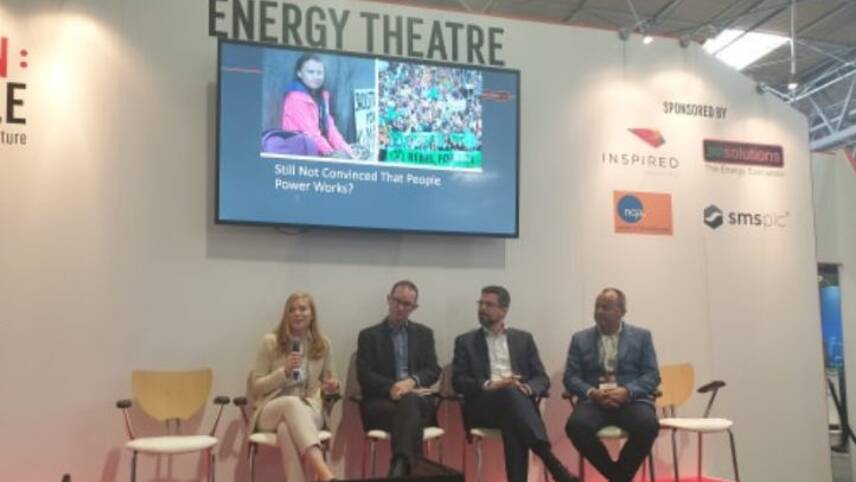Register for free and continue reading
Join our growing army of changemakers and get unlimited access to our premium content

(L:R) Tesco's energy manager Rebecca Douglas; Capgemini's head of sustainability James Robey; Vodafone's group head of energy Bernd Leven and JRP Solutions' director George Richards
That was one of the key questions asked during the big energy behaviour change debate at the Energy Theatre on Day One (21 May) of edie Live 2019.
During the 75-minute session, expert speakers from the Sustainable Energy Association, Capgemini, Tesco, Vodafone and JRP outlined how their organisations are working to take their stakeholders’ increased awareness of climate issues and use it to empower them to dramatically reduce their respective organisations’ carbon footprints and energy consumption.
Tesco’s energy manager Rebecca Douglas explained that, while the supermarket is yet to adapt its employee engagement schemes in light of the events of the past two months or so, she believes the success of small protest movements in scaling up has proved to people that their actions do have an impact. For example, Greta Thunberg’s #SchoolStrike4Climate movement began as a one-off, one-woman protest to the Swedish Parliament and is now a global phenomenon.
“Behaviour change is about knowing that if one person takes action, and that then gets rolled out across many people, then we really can make a big difference – and I think that is one of the key things the marches have highlighted,” Douglas said.
“Recent action has raised more awareness and reached more people, informing them of how big the problem is and encouraging them to work together towards a common goal.”
Tesco has notably rolled out its “Energy Matters” engagement programme for bakery and hot counter staff from four stores to 768 stores over the past two years, with its expansion resulting in a 9% reduction in its UK-wide bakery-related energy consumption.
Douglas’s sentiments were echoed by JRP Solutions’ director George Richards, who agreed that recent events have “empowered” citizens and staff to realise that small actions can add up. However, he also added that he had seen increased climate demands coming from the finance community “well before” the wider general public.
He said: “I’ve seen, over the last year, a change in the conversation that has taken place. I firstly saw investors and banks challenge their clients about what they’re doing around climate resilience, and I think that is now starting to filter down.
“Making these challenges, whatever your position in relation to the business, is what ultimately makes a difference and makes change happen faster.”
New climate conversations
Capgemini’s head of sustainability James Robey agreed with Douglas and Richards, explaining that he had already seen staff behaviours “naturally shifting” off the back of recent climate action, without the need for a new top-down engagement scheme.
Line managers, for example, have been telling the consultants working beneath them to fully read the sustainability reports of their clients before key meetings and to position the environmental benefits their services can bring as a key differentiator. He urged delegates working at companies where this may not be the case to “piggyback” off key climate news and use it to foster new frameworks for both internal and external conversations.
“This is the first time we’ve really seen people grabbing onto climate change – arguably a hard topic for people to understand, due to how abstract it can be,” Robey explained. “From my perspective, awareness like this brings an opportunity for business to start or continue key debates and get people thinking about how their actions can make a real difference.”
For Vodafone’s group head of energy performance Bernd Leven, however, staff conversations and behaviours have not changed as rapidly or naturally as they did off the back of the “Blue Planet 2 Effect”. He noted that this may not necessarily be a bad thing, as he would like the company to take a longer-term view on climate and emissions – which account for a larger proportion of its environmental footprint than plastics waste.
“I’m a bit torn on how to harness what is going on, because, for me, it’s much more important to have energy and climate topics embedded across the business beyond a single campaign [than with plastics],” Leven said.
Vodafone notably recently joined The Climate Group’s RE100 initiative, pledging to source 100% renewable electricity for its operations by 2025. This move comes as the business is striving to reduce greenhouse gas (GHG) emissions from its own network operations by 40% by the same deadline.
According to Leven, this decision was driven more by Vodafone’s key business departments and largest investors than its consumers and the general public.
Sarah George


Please login or Register to leave a comment.